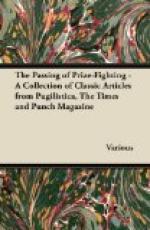I may add that Mr. WILLARD made the most of the materials provided for him; but whether that most was much or little is, and must remain, a matter of conjecture. On the whole, if I had understood aright what the sad sea waves were evidently attempting to say to me, I think I would not have attended on the 27th of August a London Matinee. But this is a thought, and nothing more. Believe me, dear Mr. Punch, yours, more in sorrow than in anger,
A CRITIC, LURED TO TOWN FROM THE COUNTRY.
* * * * *
[Illustration: THE DOCTRINE OF “HINTERLAND.”
THESE THREE GENTLEMEN DO NOT PLAY THE GAME, BUT WISH
TO TAKE A MORNING
WALK BY THE SEA.]
* * * * *
OUR BOOKING-OFFICE.
The Baron has recently been reading a new work, disinterestedly recommended to him by M. ROQUES, the French publisher and French bookseller of Bond Street, entitled L’Ame de Pierre, by GEORGES OHNET. It is a strangely fascinating story; the picturesque descriptions transport us to the very places; and the studies of life, are, specially of certain phases of French life, most interesting to an English reader. The cosmopolitan Baron DE B.W. wishes that Frenchmen, however manly they may be, were not so easily and so constantly moved to tears. This however, is only a matter of taste. What the purpose of the novel may be—for GEORGES OHNET has written this with a purpose—is not quite evident. Whether it is intended to chime in with the popular theme of hypnotism, and illustrate it in a peculiar way, or whether it is merely illustrating Hamlet’s wise remark that, “There is more in heaven and earth than is dreamt of in your philosophy,” the Baron is at a loss to determine. It is psychological, it is materialistic, it is idealistic, it is philosophical, it is ... French. The Vacuus Viator may have a worse companion on a long journey than L’Ame de Pierre.




